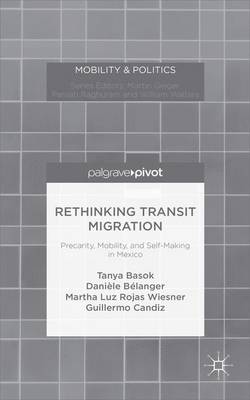Mobility & Politics
1 total work
Questioning the notion of transit migration, the authors analyze mobility and immobility among Central American migrants within the transnational space comprised of Central American countries, Mexico, and the US. They examine how mobility and immobility are shaped by the experiences of precarity in specific places, such as international borders, vertical borders, and humanitarian places. The book vividly illustrates various techniques migrants employ to counteract the paralyzing effects of precarity on mobility, while situating the analysis of migrants' precarity within the context of the US biopolitics of citizenship and the corresponding migration control policies and practices in the US and Mexico. At the same time, it scrutinizes the impact on migrants' precarity and mobility of three types of actors within the migration industry: those who facilitate the movement, those who prey on migrants, and those who assist them. Based on migrants' narratives, collected in five different locations in Mexico, the volume provides an insightful, analytically rigorous and moving depiction of migrants' tangled, dangerous, and uncertain journeys.
